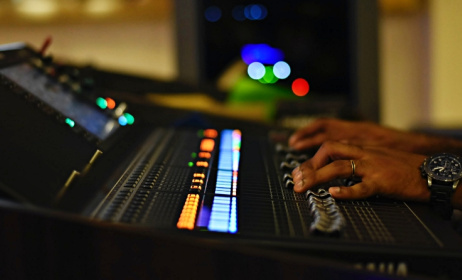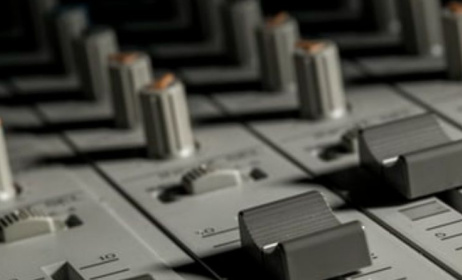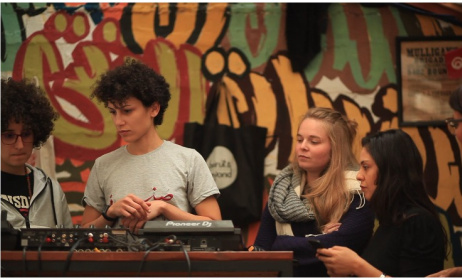Interview: SA sound engineer Garrick Van Der Tuin
This interview is part of an article on sound engineering in partnership with the African Music Development Programme.
 Van Der Tuin says 'cupping the mic' is a bad habit mostly seen with hip hop artists.
Van Der Tuin says 'cupping the mic' is a bad habit mostly seen with hip hop artists.
Introduction and live engineering
MUSIC IN AFRICA: Tell us about your work experience in the sphere of sound engineering.
GARRICK VAN DER TUIN: I’ve worked as a professional in the industry since 2001. Sixteen years later I am pleased to have worked closely with some great South African and foreign talents. As a live engineer I started working on music shows in clubs and at small events where I was mostly assisting as a stagehand. I was also involved in setting up equipment and carrying a lot of it too.
I soon progressed and gained the confidence to start mixing performances both as a monitor and front-of-house engineer. Circa 2004, I got my first gig as a ‘white-glove’ mix engineer with local Afro-pop artist Zamajobe, who rose to stardom on the Idols TV show and followed up with her highly acclaimed debut album, Ndawo Yami. This was my first taste of high-pressure work whereby we performed at many of the big festivals as well as exclusive corporate functions and gala dinners. During this time I was also working as a studio engineer and began to work closely with Zamajobe’s producer and guitarist, Erik Paliani from Malawi.
About 2008 I recorded and mixed the album Phola for Hugh Masekela, which was produced by Erik, and in 2009 we hit the road and I began my first international tour as a sound technician for Hugh Masekela. I toured with Hugh until 2015 and have had amazing work experiences in the most prolific music venues in the world such as the Hollywood Bowl, the Sydney Opera House, Carnegie Hall, the Royal Festival Hall, the Barbican and many others. I learnt a great deal about the challenges of working in venues, which were designed for unamplified performances such as operas and orchestras. We also played many acoustically perfect theatres and halls all over Europe and Scandinavia.
During this six-year period of regular touring, I also experienced working all over Africa. I have worked in Nigeria, Senegal, Angola, Kenya, Tanzania and all of South Africa’s neighbouring countries where the challenges to put on an excellent show are very different from those of the highly sophisticated and technically savvy Western countries.
Over the last five years as a live engineer, I have been working with various artists such as Afro-pop stars the Jaziel Brothers, Stimela and the late Ray Phiri, 2016 Standard Bank Young Jazz Artist Siya Makuzeni and our first lady of song, Sibongile Khumalo.
As a studio engineer I have recorded and mixed albums at various studios including my own, Playsound, for artists such as Hugh Masekela, Erik Paliani, Zamajobe, Malebo Mothema and Cameron Ward to name but a few.
What is the general standard of live sound engineering you’re confronted with outside South Africa?
It seems fairly poor in most African countries but I have seen notable improvements in the quality of equipment on offer. The key element which is missing is education. I have often seen technicians getting overwhelmed with the workload as opposed to the few who have good knowledge of the equipment and what is expected of them. Often these few technicians have been able to educate themselves online or have been selected to attend training workshops on their specific equipment or have simply learnt what they know from experience.
I don’t believe there are many schools or courses available since even here in South Africa we’ve only had audio engineering schools become more prevalent in the last six or seven years. I do see a lot of international support at many events in Africa; many production companies hire experienced technicians from Europe or South Africa to help set up and operate at their events. I myself have a regular festival every Easter in Lagos, Nigeria, where I operate the sound. I’ve had some of the best shows with excellent equipment and decent technicians in Kenya and Nigeria. Zimbabwe seems to have some really passionate technicians who go the extra mile to make it work with whatever they have available and I have always felt that they push really hard to educate themselves, most likely via the Internet.
Where and how can organisers improve, and do you think many skimp on sound?
I think organisers of music festivals and the technical production companies in Africa can improve mostly on their backstage hospitality towards the artists, especially towards the technicians involved in their productions. I have seen technicians camp out under a stage for days at music festivals and are often not looked after well enough with regards to nourishment and hydration. It takes a huge effort to work in 35 to 40°C with 80 to 90% humidity. It takes a lot of energy which can only come from a good night’s rest and good nourishment. So many times I have seen technicians completely burnt out after the setup days and by show time they aren’t in a good state of focus.
I don’t see as much skimping on sound equipment these days. I think the sound providers are in heavier competition with each other, as many of them have invested in good quality equipment that needs to get paid off as soon as possible, so perhaps the cost of a large production has come down a bit and levelled the playing field. Due to the improvement in technology there is also generally better equipment on offer by most companies.
Some bad experiences around Africa in terms of sound engineering jobs?
Nigeria promised a really large well-known brand sound system for a festival on a beach for 10 000 people. Upon arrival I had a system only suitable for 1 000 people indoors and I couldn’t for the life of me find a drop of information of the brand on the entire Internet.
In Dar es Salaam, Tanzania, I worked extremely hard for six hours trying to get a terrible sound system together with an untunable drum kit and some rusty microphones. I got it all working and sounding pretty good only to have the performance cancelled due to non-payment by the promoter.
In Mahikeng, South Arica, after a really long drive and looking forward to a potentially great performance, an average gust of wind nearly collapsed the entire stage structure!
Who are the most difficult and easiest artists to work with?
The most difficult artists to work with are probably young hip hop acts who suddenly feel they need a 10-piece band on stage to translate their music to the crowd. The band members are almost always trying to outplay each other and show off to the 'rival' musicians who are watching in the wings. The lead singers of these groups will also do something which we call 'cupping the mic'. Basically it’s how most hip hop artists look when they hold a microphone – they cover it with their hands and it creates a very screechy or muffled sound that often feeds back on stage. It can really test our patience and many engineers might just pop in some earplugs to get through the show.
I think the easiest artists to work with are the more seasoned musicians. They know what they need and what they want – and they know which battles to pick. They generally have better-crafted music that has been well-arranged. This helps a lot with a mix, especially if there is a large band involved. They also work with fantastic musicians who play with great dynamics and give you good tones out of their instruments no matter the quality or condition of the equipment they're working with.
How important is soundcheck?
If you are a headlining act or it's your big show as an artist then soundcheck is of the utmost importance. If a band is comfortable on stage they will always perform at their best and really be immerse themselves in the music, and the same will be felt by the audience. With a good soundcheck we can really squeeze every drop of goodness out of the sound system at show time. There’s nothing better than starting a show and the first song is sounding great; the band will be relaxed, the engineer will be relaxed and the audience will erupt at every possible moment. It’s a different story when you’re performing at a festival with 10 other bands on the line-up and you have a 15-minute changeover. South African festivals are notorious for those situations. This is where it really helps to have a permanent engineer who travels with you, knows your songs and can anticipate the show.
How would you go about recording an artist live and what’s the secret in capturing the ‘live sound’?
Recording an act live in the studio or at a concert has similar principles. The band must be able to hear each other well, they must also be able to see each other. I feel that a band performs best when they are close together in a room – the sound is usually better in this case too. Taking time to be near the musicians and their instruments with your naked ear is also important. If you can hear what the musician is hearing on stage, you have a better perspective of how it should sound back in the control room or in your headphones.
Some instruments are more difficult to capture than others, so if you are ever in doubt or you encounter an instrument that you're not familiar with, then approach the musician, ask them how they usually approach recording their instrument and show interest in their instrument, and what they like to hear the most from the other members of the band. Don’t be shy. Accept responsibility for everything that goes wrong and offer the solutions immediately. As soon as a musician sees that you can take criticism constructively, they will often be less critical and more helpful in getting you to help them, which is what you are there for.
You’re now studying sound system design and optimisation. How important is it to know how to set up a sound system the right way?
For good sound reinforcement and a true reflection of the music being performed, sound system design and optimisation is probably the most important factor to consider. It always amazed me how much less work I would need to do when mixing on a well-deployed sound system while touring abroad. This is especially true for when you are touring with one act and playing a similar repertoire every night in different venues. If you’re touring with a strong technical rider and have the show files saved from previous concerts, then moving from venue to venue with your band can really be a pleasure.
In that respect, you can get your soundchecks done in no time at all. Essentially if you have a good mix from a show the night before, which was performed on a correctly tuned sound system, then it should translate really well on to the next well-tuned system in a completely different environment. When sound systems behave in an accurate and linear fashion then the engineer will spend less time trying to mix correctively and will enjoy more time spent creatively or be better able to focus on the subtle balances or special effects needed for the show. A well-designed sound system is also only fair to the audience members. They all paid for their tickets and they all deserve a similar experience to their fellow fans, whether they are sitting under a balcony, in front of the stage, at the very back of a venue or all the way to the side. The reality is that the sound will never be perfect, it’s impossible, but it can be really fantastic.
Studio engineering
How do you prepare for a big studio project?
Ideally I would have a meeting with the producer; hopefully there would be only one person assuming the role. I would push to work out a workable schedule for the recording and then stick to it. I would suggest a plan as follows:
First I would prepare guide tracks of the music with a guide vocal. This can come from the producer’s pre-production or we could create the song in the studio using programmed drums and MIDI instruments. Next we arrange and order for things to be recorded. In my studio, for example, we can record 16 channels at once, so ideally we would aim to get the rhythm section down with the drums, bass, guitar and keyboards all playing together. This approach saves a lot of time and gets a good feel out of the musicians. We often end up overdubbing a part or fixing a few mistakes with the same musicians still present at the session. Sometimes it’s good to get the core musicians out of the way as soon as possible because managing a session with five or six people at once can become cumbersome.
Next we might spend a full day with a percussionist, first attacking congas and then moving on to small percussion, which we call ‘toys’. Another day spent with a brass section, next day some backing vocals, and so on. Usually we’ll take a day to get a rough mix going and do some editing to tighten things up and prepare the songs so they sound close to completion for the lead vocalist to sing on. I may send the rough mixes home with the guide vocal muted so that the producer or vocal coach can work on the songs with the lead singer. I like to be efficient in the studio and have the musicians well-rehearsed when they come in to record.
Due to budget constraints, we often fire away with one good clean-sounding setup and save the tonal shaping and creativity for the mixing process, unless there are specific songs that absolutely have to have a signature sound from the beginning. It’s really about getting the logistics right so that we keep the momentum going. This means we need commitment to the time schedule from the session musicians early on in the game.
What is the difference between engineering and producing?
Engineering is more about capturing a great performance and producing is more about getting a great performance out of the musicians. Engineering is certainly more technical and producing is more emotional.
What would it cost to start a studio that can record live bands and what is the essential equipment needed to pull off a decent recording?
It doesn’t have to cost a lot to be able to record a band. A decent-sized room with some acoustic treatment is the first place to start. Today, a lot of affordable equipment is manufactured with higher-quality components than ever before. Having an eight-channel sound card is all you need for a slow and steady approach to the process.
You can lay down drums with the pre-programmed music and move on to the rest of the instruments one by one. Generally, the drum recording will need the most amount of inputs out of all the instruments.
Recording a vocal involves a better soundproofed room since the microphones are usually running at a hot level and exterior noises like aeroplanes, traffic and construction sites can ruin a good recording, more specifically on quiet songs with less music to hide the noise. The other option is to record voices at night when the area settles down.
Essential equipment would involve a set of drum microphones, the best vocal mic you can afford, a small soundcard and some small, good-quality speakers. It’s getting easier and more affordable for anyone to be able to record music. To do it well and have it sound great right from the start is something that one can only learn with experience and dedication to the art of recording.
Should young engineers go for sound engineering in the TV, music or radio spheres? Which is most lucrative and from which can you learn the most?
TV is the most lucrative. It seems like if there is a camera rolling there is always a budget for sound to be recorded. Broadcast engineering for radio and TV has good funding allocated to it. The music industry is a different ball game. Record labels are disappearing and more people are recording in their bedroom, self-funding their albums and listening to mp3-quality music on terrible little ear buds, so the standard for music recording has dropped a lot.
In TV and broadcasting it’s more about conforming to the standards than anything else and personally it seems a bit boring to me. I think you can learn as much in each of the areas if you have the drive to. Technology is changing at a rapid rate in broadcast. In the music scene you can be exposed to more varied experiences. You could be mixing a show with your band for 10 000 people in a foreign country one day, recording a DVD shoot on another or doing some simple singer-songwriter albums, and everything in between. I think the music scene will take you more places. The broadcast scene will give you more security financially, potentially at the cost of boredom and loss of passion.
Education and job opportunities
What’s the best route to take to get formal education in sound engineering?
There are colleges offering good courses with a three-year syllabus. Here you’ll learn a little bit of the ins and outs of broadcast work as well as music work and get to work with the software and hardware needed to do the job.
Can it be done via the Internet and which are the good online courses available?
It can. I am not aware of any courses in particular. There is a lot more free information available these days, often from manufacturers who post educational tips and tricks using their products. I am currently doing an online course on sound system design and optimisation but it doesn’t offer any official certification. I have learnt a lot from the Internet. Some of it is bad information and some of it is invaluable. It has to go hand-in-hand with practical work experience though, so I still think that being able to get your hands on some equipment is the best way to go when starting out.
Should one be open to all modes of sound engineering?
Definitely be open to everything. The principles of audio engineering remain the same in all fields. One of them will grab you. It might be live engineering, studio, broadcast or sound system deployment. Throughout your career you will weave in and out of different areas of audio and that’s great because it means there is always room for growth and always new challenges.
How do you network and get jobs in sound engineering?
Attend workshops when they are on offer, hang out with musicians, never say no to any sound job. Hang out with other engineers or people involved in technical productions of any sort. Don’t be shy. If there’s a company you would like to work for, go there, tell them, hang around and learn.
What are the best practices of sound engineering? What is most important to you?
Keeping a cool head under pressure, being as prepared as possible for anything so that you can go the extra mile for those working with you and those you are working for.






























Comments
Log in or register to post comments